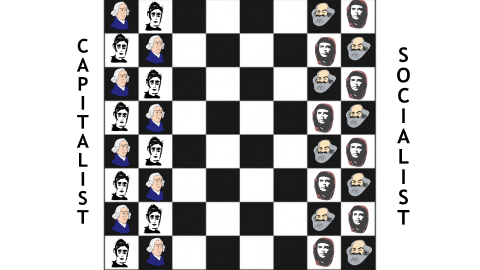Our system of politics is tribalistic. It demands we choose a side and thereafter display loyalty to our cohorts. But upon joining a group our capacity to think objectively becomes compromised and we become biased. We begin to sacrifice our own opinions for the sake of the group. Energy becomes focused upon "winning" and the intellect is dulled.
Having a wide spectrum of opinions, beliefs and world views is good for a society. However when this diversity can only be expressed within the confines of a group it has both a homogenising and polarising effect.
Whereas the political views of a given population may cover a wide spectrum, party politics forces a homogeneity as each member must subvert their own opinions, beliefs and world views in order to fit in.
The extremists in any group are most visible and hence often define the group. But whenever an extreme position is taken in one group, an equal and opposite extreme position is taken in an opposing group. This balancing factor occurs throughout all of nature. We can even see this in small groups of two.
Hence a polarising effect is created as the population merges into their respective camps. The myriad of shade and nuance in the wide spectrum becomes 2 or 3 solid colors separate and distinct with little gradation.
The larger the group, the smaller the bandwidth becomes. Power becomes concentrated into fewer and fewer hands. Hence the ability for any one individual to effect change becomes more and more remote. Thus membership of larger and larger groups is required.
Soon exerting control becomes a monumental task. The more monumental the task, the more one must develop an unwavering belief in the cause. Unwavering beliefs often lead to bigotry as the mind becomes fixated upon a goal.
The larger the group, the more pronounced the tribalism and bigotry. The more pronounced the tribalism and bigotry the higher the capacity for all-out destructive war.
Contrary to popular belief war is not the result of too much conflict but of too little civilised intellectual conflict in the form of reasoned debate at the level of the individual.
Though many are calling for solidarity, consolidation and union of the European Nations, the reality of large groups is that they tend towards polarization and bigotry. The larger the group the more extreme the effect. We can see this in the United States where extremism is rife. The gangs on either side are huge.
The movement of our society should be toward personal sovereignty and conflict resolution at the individual level. We must move away from the extreme polarisation of large groups.
What's the answer to extreme polarisation?
Learn to think for yourself. Just say "no" to the herd.

